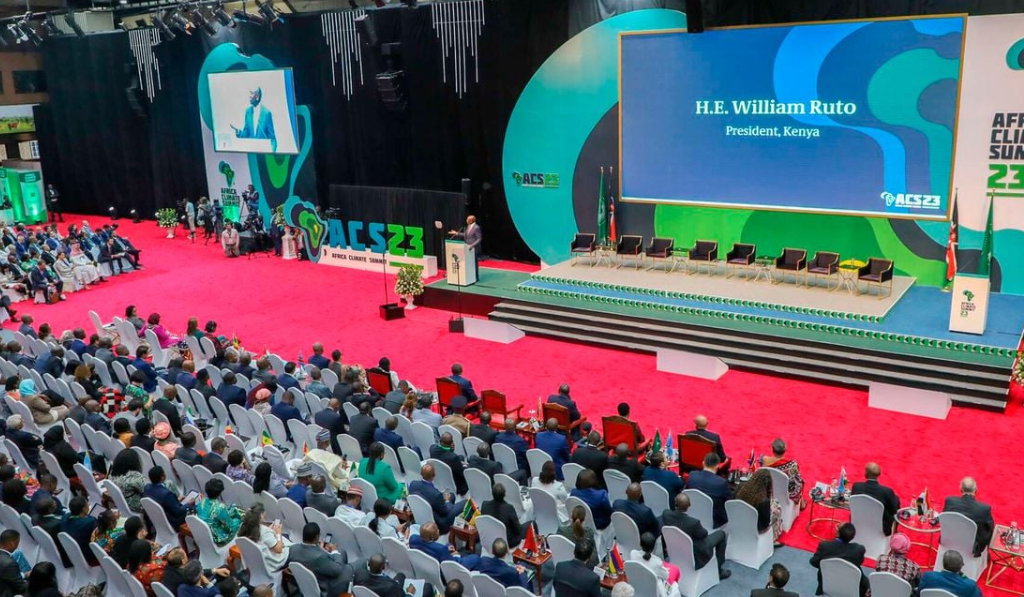Originally published in Nation Africa

President William Ruto speaks at KICC, Nairobi on Monday, September 4, 2023 during the during the Africa Climate Summit 2023. Photo by Dennis Onsongo | Nation Media Group
Africa is facing multiple crises that threaten its development and well-being. Climate change, biodiversity loss, the Covid-19 pandemic and the war in Ukraine have all taken a toll on the continent’s economy, health, security and stability. But these crises also offer an opportunity for Africa to demonstrate leadership and innovation in finding solutions that are sustainable, inclusive and resilient.
The ongoing Africa Climate Summit is a key platform for Africa to showcase its vision and actions for a green recovery and a low-carbon future. The summit brings together African governments, civil society, private sector and development partners to discuss and agree on concrete commitments and initiatives that will accelerate the implementation of the Paris Agreement and the Kunming-Montreal Global Biodiversity Framework in Africa.
Political events
The summit will also influence the global climate agenda by providing inputs and recommendations for the upcoming political events of the year such as the Regional Climate Weeks, the UN General Assembly and the COP28 negotiations in the UAE. It will also contribute to the first Global Stocktake, which will assess the collective progress and gaps in achieving the goals of the Paris Agreement. Moreover, the summit will align with the International Renewable Energy Agency’s Assembly in October, which will focus on scaling up renewable energy solutions in Africa.
The summit will showcase Africa’s readiness and willingness to use its own assets such as its mineral and energy resources, its agricultural potential and its natural capital, to support the global decarbonisation agenda. The summit will also highlight Africa’s youthful and dynamic population, which represents over 60 per cent of the continent’s people. Africa is the young, clean, green continent of the future.
One of the key outcomes that the summit can deliver is to commit to phasing out fossil fuels and accelerating the transition to renewables. The need for this is urgent as Africa faces the dual challenge of mitigating climate change and achieving sustainable development. Africa has a unique opportunity to leapfrog to 100 per cent renewables, avoiding gas as a bridge fuel and harnessing its abundant solar, wind and hydro resources. According to the International Energy Agency World Energy Investment Report released in May this year, Africa has 60 per cent of the world’s best solar potential and solar investment is set to surpass oil investment for the first time. The summit can lead on this by setting clear targets and actions for phasing out fossil fuels and scaling up renewables in Africa.
Another deliverable that the summit can achieve is to enhance the alignment between biodiversity and climate. Africa’s rich biodiversity and natural resources are vital for its climate resilience and adaptation. Africa has been a leader in implementing Nature-Based Solutions through initiatives such as the Africa Forest Landscape Restoration Initiative, The Great Green Wall, and the Great Blue Wall. The summit can build on this by ensuring that the revision and update of National Biodiversity Strategies and Action Plans incorporate climate change considerations.
A third deliverable that the summit can pursue is to advocate for new and increased finance for climate and nature and fulfillment of unmet contributions. According to a report by the Climate Policy Initiative, Africa needs USD 2.8 trillion from 2020 to 2030 to implement its NDCs under the Paris Agreement. The creation of the Global Biodiversity Framework Fund, at the recent GEF Assembly in Vancouver, offers a great opportunity for addressing the biodiversity crisis. However, it is essential that the fund works for Africa by being adequate, transparent, predictable and timely; and benefits Indigenous Peoples and Local Communities. The Africa Climate Summit and Africa Climate Week are crucial platforms for calling for concrete financial commitments and the operationalization of the Loss and Damage Fund ahead of COP28.
The fourth deliverable that the summit can work on is to align climate adaptation with food systems transformation. Africa has the potential to feed the world and itself with its vast arable land. However, climate change is threatening agricultural productivity due to rising temperatures, erratic rainfall patterns and extreme weather events such as droughts and floods. After three years of drought, more than 27 million people are facing acute food insecurity in Ethiopia, Somalia, Kenya and Uganda, which has resulted in the deaths of an estimated 9.5 million livestock; a situation that will worsen as temperatures exceed 1.5°C.
The Africa Climate Summit is a critical moment for Africa to demonstrate its leadership and commitment to climate action and nature conservation. The summit can achieve the above four key outcomes that will advance the continent’s climate resilience and adaptation as well as its contribution to limiting global warming to 1.5°C. These outcomes will also support the implementation of the African Union Agenda 2063, the Sustainable Development Goals, and the Paris Agreement. We urge all stakeholders, including governments, civil society, private sector, development partners, and youth, to join us in making this summit a success and a turning point for Africa’s climate and nature agenda. The time for action is now. Let us make this summit count.
Alice is a senior director, Policy Influence and Engagement: Africa, Asia-Pacific & Europe at the World Wide Fund for Nature International
Read the article: Four ways Africa can shape the global climate agenda through summit Nation Africa, September 05, 2023

